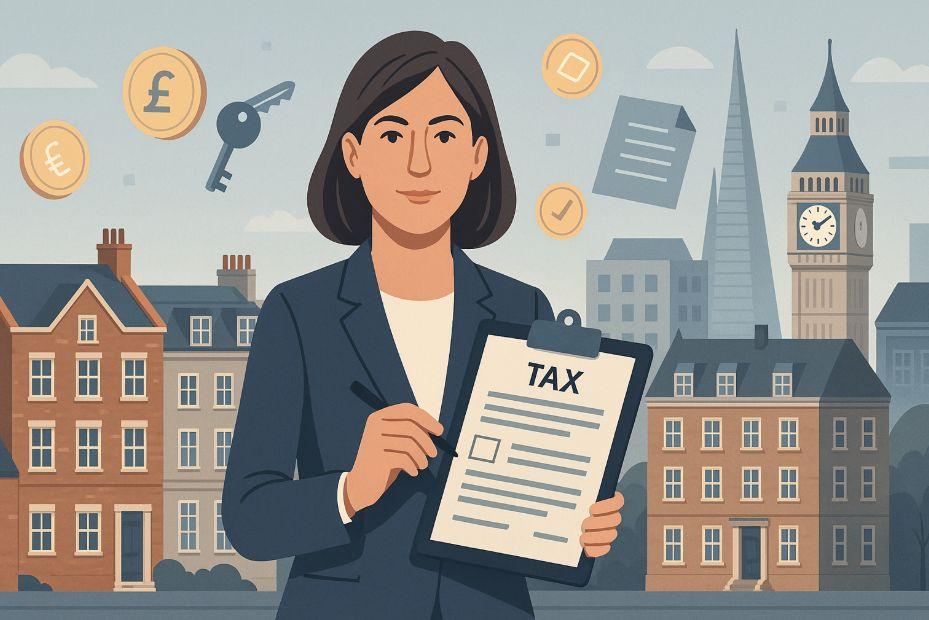Taxation has long been a contentious issue in the UK property market. With the rise in property values and growing pressure to address housing inequality, political parties are increasingly turning their attention to landlords.
At the heart of this renewed focus is Rachel Reeves, the Shadow Chancellor of the Exchequer, whose tax proposals are drawing both support and criticism from the real estate sector.
As Labour positions itself for potential leadership, Reeves’ stance on landlord taxation is shaping the conversation around property ownership, housing reform, and economic justice.
In this article, we break down what property owners need to know about Rachel Reeves’ proposed landlord tax changes, what implications it may have for the London market, and how landlords can prepare.
Why Are Rachel Reeves Tax Plans Making Headlines?

Rachel Reeves is a senior Labour MP and currently serves as the Shadow Chancellor. Known for her fiscal prudence and centre-left economic stance, she has gained prominence by advocating a fairer tax system that reduces inequalities.
Her proposals aim to close gaps that have historically benefited high-net-worth individuals, including landlords who generate significant income from property.
Recent statements and policy hints suggest a broad review of property-related tax rules under a Labour government triggering both interest and concern among landlords and investors.
What Is the Proposed Rachel Reeves Landlords Tax Policy?
While Labour has not released a formal tax bill, Reeves has indicated that property owners, particularly landlords with multiple holdings, could see changes in the way their income and gains are taxed.
Central to her proposal is a commitment to reducing inequality and ensuring those who profit from assets like real estate contribute more in taxes. Likely areas of change include capital gains tax, rental income deductions, and regulations on overseas property ownership.
The language of “fair contribution” has become a hallmark of Labour’s economic message, suggesting that any new landlord tax framework would align with broader housing reforms.
How Will These Tax Reforms Affect Buy-to-Let Property Owners?
Buy-to-let investors are expected to be among the groups most affected by potential changes. The profitability of rental investments may come under pressure, especially for those with heavily mortgaged properties or those operating in high-value areas like London.
Potential outcomes include:
- Reduced profit margins
- Increased reporting requirements
- Greater scrutiny on tax efficiency methods
As the financial environment becomes tighter, landlords may need to re-evaluate how sustainable their investment models are in the medium term.
Are Capital Gains Tax and Rental Income Rules Changing?

Capital Gains Tax (CGT) has already undergone several changes in recent years, but Rachel Reeves has indicated that further reform could be on the table. This could include reducing the CGT tax-free allowance or aligning CGT rates more closely with income tax rates.
Rental income may also come under review, particularly in terms of allowable expenses. Past measures like the reduction of mortgage interest relief may be expanded, leading to higher taxable income for landlords.
Here’s a comparative look:
Tax Element |
Current Position |
Possible Reform Direction |
| CGT Rate | 18% basic, 28% higher rate | Potential increase in higher rate |
| CGT Allowance | £3,000 (2025) | Possible further reduction |
| Rental Deductions | Limited mortgage interest relief | Stricter limits or removal |
| Overseas Taxation | Non-doms enjoy tax benefits | Rules under review |
What Are the Implications for London-Based Private Landlords?
London landlords face unique challenges due to the city’s high property values, demand-driven market, and political sensitivity around housing shortages. Reeves’ proposed tax reforms could make property investment in the capital less attractive, especially for smaller landlords.
Concerns include:
- Stricter taxes on second and third properties
- Reduced investor interest from overseas
- An increase in operational and compliance costs
As affordability remains an issue in London, tax reform could serve as a mechanism to rebalance the market but not without disruption for current property owners.
How Does Labour’s Housing Policy Tie into the Tax Proposal?
Labour’s broader housing strategy seeks to increase the availability of affordable homes and reduce speculative investment in housing. The party has pledged to build 1.5 million homes over the next parliament, strengthen renters’ rights, and curb practices such as land banking.
Reeves’ landlord tax fits into this narrative by redirecting wealth accumulated through property back into public services and housing initiatives. While critics argue this approach risks shrinking rental supply, supporters believe it could correct a long-standing imbalance in housing policy.
Can Landlords Expect a Rise in Operating Costs or Tax Bills?

In all likelihood, yes. Between potential CGT increases, changes to income tax treatment, and tighter regulatory controls, landlords may see their overall costs increase. This includes not only tax liabilities but also expenses related to legal compliance, property management, and financial planning.
For example, if capital allowances or expense deductions are reduced, the effective tax rate on rental profits could rise decreasing net income. Combined with inflation and interest rate volatility, these costs could reshape how landlords manage their portfolios.
What Tax Planning Strategies Can Property Owners Consider Now?
With policy changes on the horizon, preparation becomes essential. Although nothing is confirmed, landlords can begin to assess the potential impact and build a more resilient financial strategy.
Key approaches include:
- Reviewing ownership structures (individual vs. company)
- Timing asset sales in anticipation of CGT reform
- Maximising current tax allowances while they remain
- Seeking expert tax and legal advice tailored to property investments
By acting early, landlords can position themselves to respond strategically, rather than reactively.
How Might These Changes Impact the UK Rental and Housing Market?
Taxation is a major lever in the housing market, and changes often ripple beyond landlords to affect tenants and developers. If taxation reduces profit potential, some landlords may choose to exit the market altogether reducing rental supply.
This could lead to:
- Higher rents due to limited supply
- More competition among tenants
- Fewer affordable rental options in high-demand areas like London
On the other hand, if Labour’s home-building goals succeed, the longer-term impact may be a stabilisation of housing costs and better rental conditions.
What Are the Reactions from Landlords and Property Investment Groups?

The response from the property sector has been mixed. Industry bodies like the NRLA have warned that excessive taxation could cause a “landlord exodus,” exacerbating the housing shortage. Meanwhile, some analysts believe that shifting investment away from speculative landlords could open doors for first-time buyers and local residents.
The common theme is a call for clarity landlords want to understand exactly what changes are coming so they can plan accordingly. For now, the uncertainty is fuelling caution.
Potential Tax Changes Under Rachel Reeves
Area of Impact |
Current Regulation |
Potential Reform Direction |
| Capital Gains Tax | 18%-28% on property profits | Higher rates, lower thresholds |
| Rental Income Tax | Standard income tax rates | Fewer deductible expenses |
| Non-Dom Status | Partial exemptions for overseas owners | Possible overhaul or abolishment |
| Corporate Structures | Often used for tax efficiency | Increased regulation and transparency |
What Should Landlords Do to Prepare for Possible Tax Reforms?
Preparation is the most reliable defence against sudden regulatory shifts. Landlords should start by auditing their current portfolio and understanding how proposed policies could affect their holdings.
Creating contingency plans, diversifying assets, and building cash reserves could soften the blow of increased costs or reduced profits. Most importantly, keeping up with news and engaging professionals with property tax expertise will be vital.
Conclusion
Rachel Reeves’ proposed changes to landlord taxation reflect a broader political shift toward rebalancing economic fairness in the UK housing market. While the exact details of her policies remain under development, the signals are clear: landlords, particularly those with multiple or high-value properties, should prepare for a more tightly regulated and potentially costlier environment.
For London property owners, these reforms could have significant financial and operational implications from higher tax bills to strategic adjustments in how portfolios are managed. The landscape is evolving, and while there is reason for concern, there is also opportunity for those who act early, stay informed, and seek expert guidance.
FAQs
Will Labour’s landlord tax proposals be implemented immediately?
It’s unlikely. Even if Labour wins, new tax laws typically require time to pass through Parliament and undergo consultation.
Can I reduce exposure by transferring properties to a company?
Possibly, though incorporation has costs and isn’t suitable for every landlord. Professional tax advice is essential.
Will overseas property owners be taxed more heavily?
Yes, especially if Labour follows through on plans to abolish or reform non-dom status privileges.
Is London more exposed to these tax changes?
Definitely. Higher property values and larger landlord portfolios in London make the capital a prime target for reform.
Should I consider selling my property now?
If you’re nearing retirement or heavily reliant on CGT reliefs, selling before reforms take place may be worth considering.
How will these changes affect new landlords?
Higher barriers to entry may discourage new investors or lead them to consider alternative asset classes.
What other policies could impact landlords under Labour?
Rent controls, increased tenant protections, and stricter licensing could all be on the table.









Leave feedback about this